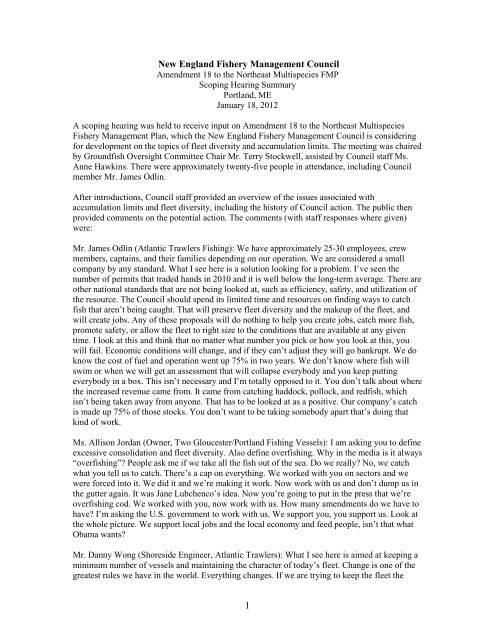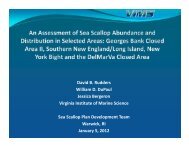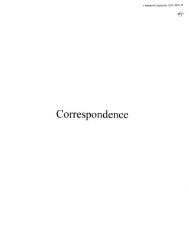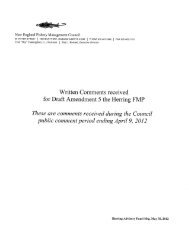Portland, ME - New England Fishery Management Council
Portland, ME - New England Fishery Management Council
Portland, ME - New England Fishery Management Council
You also want an ePaper? Increase the reach of your titles
YUMPU automatically turns print PDFs into web optimized ePapers that Google loves.
<strong>New</strong> <strong>England</strong> <strong>Fishery</strong> <strong>Management</strong> <strong>Council</strong><br />
Amendment 18 to the Northeast Multispecies FMP<br />
Scoping Hearing Summary<br />
<strong>Portland</strong>, <strong>ME</strong><br />
January 18, 2012<br />
A scoping hearing was held to receive input on Amendment 18 to the Northeast Multispecies<br />
<strong>Fishery</strong> <strong>Management</strong> Plan, which the <strong>New</strong> <strong>England</strong> <strong>Fishery</strong> <strong>Management</strong> <strong>Council</strong> is considering<br />
for development on the topics of fleet diversity and accumulation limits. The meeting was chaired<br />
by Groundfish Oversight Committee Chair Mr. Terry Stockwell, assisted by <strong>Council</strong> staff Ms.<br />
Anne Hawkins. There were approximately twenty-five people in attendance, including <strong>Council</strong><br />
member Mr. James Odlin.<br />
After introductions, <strong>Council</strong> staff provided an overview of the issues associated with<br />
accumulation limits and fleet diversity, including the history of <strong>Council</strong> action. The public then<br />
provided comments on the potential action. The comments (with staff responses where given)<br />
were:<br />
Mr. James Odlin (Atlantic Trawlers Fishing): We have approximately 25-30 employees, crew<br />
members, captains, and their families depending on our operation. We are considered a small<br />
company by any standard. What I see here is a solution looking for a problem. I’ve seen the<br />
number of permits that traded hands in 2010 and it is well below the long-term average. There are<br />
other national standards that are not being looked at, such as efficiency, safety, and utilization of<br />
the resource. The <strong>Council</strong> should spend its limited time and resources on finding ways to catch<br />
fish that aren’t being caught. That will preserve fleet diversity and the makeup of the fleet, and<br />
will create jobs. Any of these proposals will do nothing to help you create jobs, catch more fish,<br />
promote safety, or allow the fleet to right size to the conditions that are available at any given<br />
time. I look at this and think that no matter what number you pick or how you look at this, you<br />
will fail. Economic conditions will change, and if they can’t adjust they will go bankrupt. We do<br />
know the cost of fuel and operation went up 75% in two years. We don’t know where fish will<br />
swim or when we will get an assessment that will collapse everybody and you keep putting<br />
everybody in a box. This isn’t necessary and I’m totally opposed to it. You don’t talk about where<br />
the increased revenue came from. It came from catching haddock, pollock, and redfish, which<br />
isn’t being taken away from anyone. That has to be looked at as a positive. Our company’s catch<br />
is made up 75% of those stocks. You don’t want to be taking somebody apart that’s doing that<br />
kind of work.<br />
Ms. Allison Jordan (Owner, Two Gloucester/<strong>Portland</strong> Fishing Vessels): I am asking you to define<br />
excessive consolidation and fleet diversity. Also define overfishing. Why in the media is it always<br />
“overfishing”? People ask me if we take all the fish out of the sea. Do we really? No, we catch<br />
what you tell us to catch. There’s a cap on everything. We worked with you on sectors and we<br />
were forced into it. We did it and we’re making it work. Now work with us and don’t dump us in<br />
the gutter again. It was Jane Lubchenco’s idea. Now you’re going to put in the press that we’re<br />
overfishing cod. We worked with you, now work with us. How many amendments do we have to<br />
have? I’m asking the U.S. government to work with us. We support you, you support us. Look at<br />
the whole picture. We support local jobs and the local economy and feed people, isn’t that what<br />
Obama wants?<br />
Mr. Danny Wong (Shoreside Engineer, Atlantic Trawlers): What I see here is aimed at keeping a<br />
minimum number of vessels and maintaining the character of today’s fleet. Change is one of the<br />
greatest rules we have in the world. Everything changes. If we are trying to keep the fleet the<br />
1
same, in 100 years is it going to look the same? Maybe we need to keep our hands off this for a<br />
few years and see how things work out as it is now. Trying to engineer a solution to this problem<br />
is the wrong way to go. Maybe we should let the market regulate itself.<br />
Ms. Amanda Odlin (F/V Lydia Maya and F/V Bethany Jean): First, I wholeheartedly agree with<br />
Ms. Jordan. She worded it perfectly. From what I understand, Amendment 16 states that one of<br />
the benefits of sectors is they provide incentives to self-govern, therefore reducing the need for<br />
the <strong>Council</strong> to make more regulatory measures. We went into sectors to do this, so to layer it with<br />
more complications – we already just adjusted from an old system to a new one. Change is funny<br />
like that; it’s always a great idea for those pointing fingers at the ones they want to be changing. I<br />
think we ought to give it a few more years to see how it all fleshes out. It seems to me that all of<br />
these things being brought up were raised long before catch shares became the law of the land.<br />
We screamed it at the Gloucester rally and here we are trying to put the cart back into the horse. I<br />
thought the idea of state permit banks was to take care of some of these issues for the community<br />
and the smaller boats. My idea is to not layer it with more complications than it already has. Step<br />
on a boat today and see what it’s like to operate within these parameters. Simplicity has some<br />
place in the world; why make it more complicated than it already is? Ms. Lubchenco did state as<br />
soon as she took office that her aim was to consolidate the fleet. This seems counteractive to what<br />
the agency wants. We the fishermen are being tweaked between two things that can’t exist. We’re<br />
in a consolidating way of doing business, yet now we’re fighting it. We can’t do it both ways. I<br />
prefer not to see any more layering of thick rules. Wait until we have some information and<br />
definition, and see how that would work.<br />
Mr. Angelo Ciocca (Nova Seafood, <strong>Portland</strong> <strong>ME</strong>): To me you have two different things lumped<br />
together. Fleet diversity and accumulation limits are two drastically different things. Is this hiding<br />
behind a fish grab? Diversity could be taken care of separately from accumulation limits. As to<br />
the concentration of revenues chart showing more concentration in 2010: one year doesn’t make a<br />
trend. To jump to conclusions after one year is very foolish in my mind. Is it NMFS’ job to say<br />
who should and shouldn’t catch the fish? They should manage the resource and let market<br />
conditions take care of who’s going to catch the fish. I believe most of the fish in <strong>New</strong> <strong>England</strong><br />
were caught on larger vessels than we have today. The smaller fisheries are a more recent thing. I<br />
assume it gravitated to larger boats because of efficiencies. Amendment 18 needs to go to the<br />
garbage heap; you should give sectors a little bit of time, and separate fleet diversity and<br />
accumulation limits. Also who is behind this amendment? Last but not least, NMFS and the<br />
<strong>Council</strong> have much bigger problems than figuring out who is going to catch the fish right now.<br />
Give us the fish to catch and spend time on the issues of the day, not the issues that might be out<br />
there in 10 years. Nobody in the world in the fish harvesting business wants to come to <strong>New</strong><br />
<strong>England</strong> and get involved in the poor returns you see here.<br />
Mr. Robert Odlin (Scarborough, <strong>ME</strong>): I bought into the groundfish fishery in 2005 and at the time<br />
we were working under DAS – that was the currency we used to trade. We leased days and there<br />
were an ample amount to be leased. Each day allowed 800 lbs. of cod, 1000 lbs. of hake, and<br />
unlimited pollock. I’m a strong opponent of catch shares. A lot of people like them, but I’d love<br />
to see them go. There’s an unfair quota distribution. When we went from DAS to catch shares<br />
they removed the baseline criteria for leasing. It’s not in my nature to come to a room and<br />
complain. I don’t care about accumulation limits; I don’t have enough fish to fish for a year. Now<br />
I’m forced to be a sharecropper. I didn’t get a boat with a lot of history, and I was catching other<br />
types of fish during the magic years, but I’ve been a fisherman since 1984. Catch shares were<br />
unfairly forced down our throats. There was a big rally in Gloucester and a lot of the people in<br />
this room opposed catch shares, and now a lot of the same people like them. They were winners. I<br />
don’t hold it against them. They were lucky, they worked hard. Policy shouldn’t be killing jobs. It<br />
2
looks like in Maine there was a slow ratcheting down of boats until 2010. We lost 25% of our<br />
boats right off the bat and now are down to 72% of our boats. That’s wrong if you have guys that<br />
still want to fish in Maine. If they don’t care and are happy to move or whatever that’s fine, but<br />
even if you operate a boat with one or two people you are still making a living and providing for<br />
your family. There were four options for the catch share allocation. Somehow we based<br />
everything wholly on history, not vessel size, horsepower, or DAS. That’s wrong. I’d like to see<br />
us reallocate the fish a little more fairly. There are a lot of guys who magically became nearmillionaires<br />
overnight and other guys are forced to go work for them. Fleet diversity means a lot<br />
of different boats and different size fisheries. For eight months a year I can still work the boat and<br />
that’s what I want to do. I don’t want a handout, I’d like to stay in the business and don’t think<br />
I’ll be able to. If this amendment can somehow distribute the quota more fairly, I support it. I<br />
don’t care about accumulation limits; they are beyond the scope of what I can think about at this<br />
time.<br />
Mr. Brett Tolley (Northwest Atlantic Marine Alliance): I’m from a four-generation fishing<br />
family. My father, brother, cousins, and uncles are fishermen in sectors. I’m here to speak in<br />
favor of this amendment. This is an issue that we’ve been really concerned about over the past<br />
two years. During that time I’ve been meeting with family fishermen around <strong>New</strong> <strong>England</strong>. One<br />
thing that stood out is the disproportionate impact that consolidation has had on small-scale and<br />
owner-operator fishermen, and that’s really the heart of the problem. It’s not that it’s<br />
consolidating, but who it’s affecting the most. In the 2010 NOAA sector report, a statistic stood<br />
out that boats in the fleet over 70 ft. had landings increase about 10% while boats under 50 ft. had<br />
them decrease by over 50%. Clearly there is a disproportionate impact happening. As to the<br />
comments about letting the free market take its course, I think we need to take a look at lessons<br />
we’ve learned from other parts of the economy. On the farm side, for example, when we didn’t<br />
pay attention to who was farming, we got industrial farming companies that destroyed our land,<br />
gave us unhealthy food, and destroyed family farmers. I think it does matter who fishes, and I<br />
think that’s what this amendment can do. If we do nothing, there will be little access for new<br />
entrants, and nothing that resembles a diverse fleet. We oppose the no action alternative. For<br />
goals we recommend the <strong>Council</strong> to consider, they are to foster an affordable fishery through<br />
programs and policies that don’t disproportionately impact certain people in the fleet, to prevent<br />
heavy concentration of fishing effort in inshore areas, and to limit the concentration of quota for<br />
any one entity.<br />
Mr. Marty Odlin (Fisherman, S. <strong>Portland</strong> <strong>ME</strong>): I just started working as a fourth-generation<br />
fisherman in the commercial groundfish fishery. My job is to find flexibility to target the<br />
healthiest stocks of cod, pollock, or haddock. I am opposed to any limits. I spent the last seven<br />
years in china doing sustainable engineering, where I learned a few things. You ignore the global<br />
economic context at your own peril. Factories are in china because they’re able to innovate in<br />
response to economic conditions. Accumulation limits will calcify the fleet and deteriorate our<br />
ability to adapt our responses. I’ve also learned that sustainability is about taking the widest and<br />
longest view possible, and the interaction between environmental and social factors. This<br />
amendment is looking only at social factors, and ignoring environmental needs including getting<br />
more efficient boats.<br />
Mr. Ciocca: I want to clarify something. I’m a seafood dealer and processor, and am all for fleet<br />
diversity. I love owner-operators because they have to mortgage their shoes just like I do to run<br />
their business. Everything I own is on the line to operate. I’m all for fleet diversity, but it<br />
shouldn’t be lumped with accumulation limits. To think it is okay to take something that people<br />
have worked hard for, and to think they have the right to get that for nothing is another form of<br />
welfare. They’re wannabe welfare recipients and that’s not the American way.<br />
3
Mr. Ben Martens (Midcoast Fishermen’s Association): A lot of really good things have been said<br />
tonight. We have to focus on the comments that made a lot of sense. One is that this should have<br />
been done before or during the Amendment 16 process. That is valid, but doesn’t mean we should<br />
not be doing it now. It does not mean we shouldn’t think about what we want our industry to look<br />
like and plan for smart growth into the future. We should start looking at it in the way of how we<br />
want our fleet to look in the future, what we want to be doing in the future, and how we plan for it<br />
now. We are looking at Amendment 18 for some innovative ways to see how the smaller vessels<br />
with smaller landing limits can be competitive with larger vessels. We will be submitting more<br />
formal comments; this is very complex issue.<br />
Mr. Michael Russo (Groundfisherman, Cape Cod MA): I have been in the fishery since 1984.<br />
One thing for certain is that you should never say never. I have been involved in every fishery on<br />
a 50-ft. vessel and am also a member of the groundfish AP. I stand by the motions we approved<br />
and forwarded to the <strong>Council</strong>. I think there are more important things we can be working on than<br />
this. I have had many boats under 50 ft. and if you look at Cape Cod, the fishery is almost<br />
nonexistent, and captains are happy that they can lease their cod out and go fish on skates. I have<br />
leased fish from all sizes of vessels and all gear types. That’s how you preserve fleet diversity.<br />
I’ve been dedicated to groundfish for the last 20 years, and I need to be able to access fish and<br />
lease out to all vessels in the fishery. Fleet diversity is in the eyes of the beholder. I see the fishery<br />
going offshore. Do I want to take five-day trips? No. But I need to be involved to get an<br />
investment in the fishery and a safe platform to catch groundfish.<br />
4







